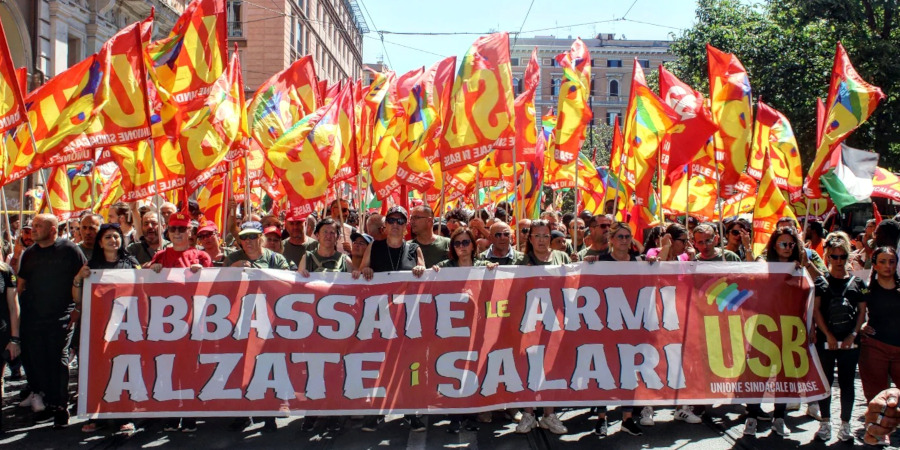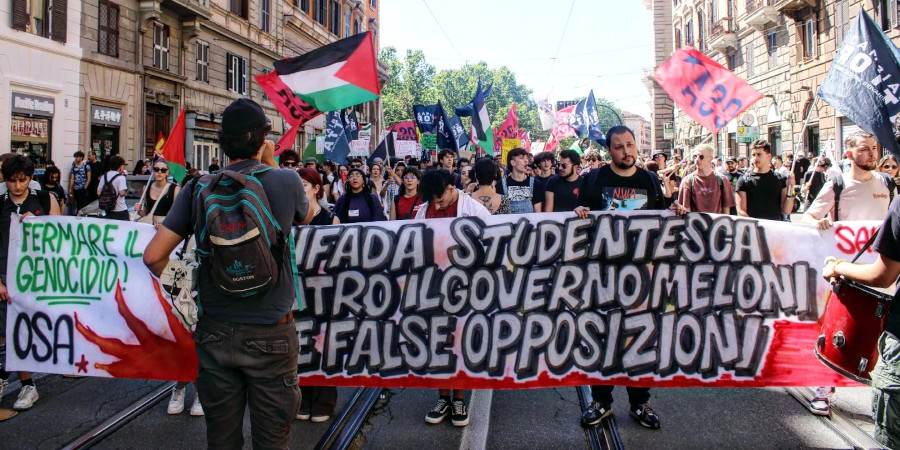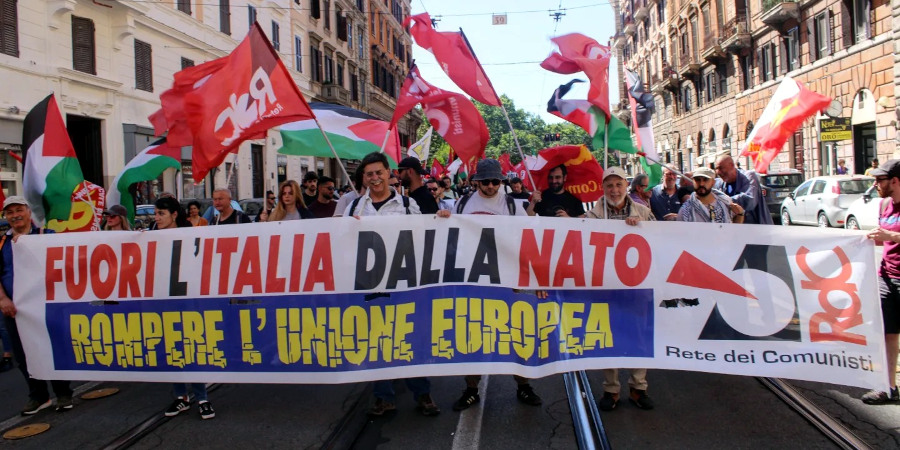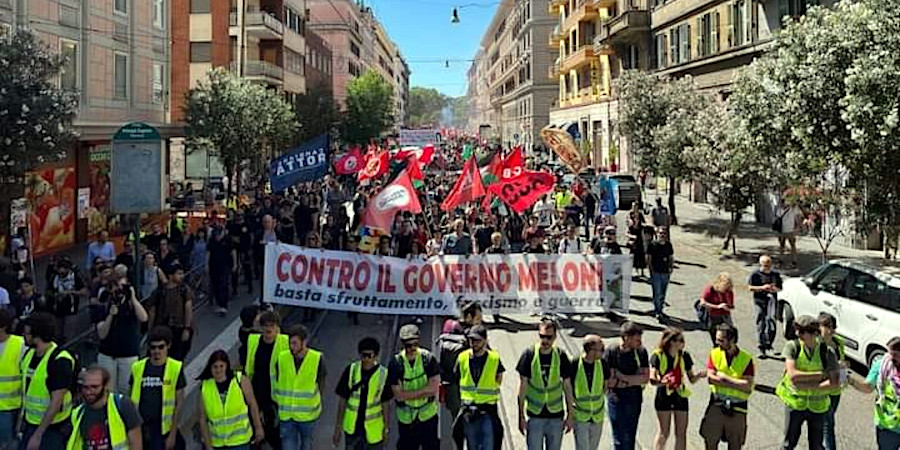| english | español | français | italiano |
Rete dei Comunisti in International Bulletin July 2024
For Unione Sindacale di base (USB), too, the months from the beginning of the year to the end of April were marked by numerous events and episodes of class conflict and mobilisations of solidarity with Palestine against the occupation and genocide perpetrated by the Zionist government of Netanyahu, in which the USB structures participated together with the movement in support of the resistance of that people and against the Meloni government, in which participation in the national demonstration on 1 June in Rome represented a strong commitment.
But this was only part of the commitment and trade union work of USB, which has been severely tested by the repressive measures of the government and the judiciary.
We remember the continuous bans imposed on our transport strikes, from local public transport to rail strikes, by the minister of infrastructure, that Salvini who was unleashed to defend the right to mobility only during struggles and whom we decided to disobey more than once.
Not to mention the dozens and dozens of complaints against our logistics workers and comrades as well as the dockers of Genoa for blockades against ships loaded with dangerous weapons.
But the most shocking aspect of these months has been the exponential increase in deaths at work, which on more than one occasion have taken on the character of real massacres: from the five workers run over by a train at Brandizzi while working on the railway line, to the five who died on 17 February when a slab collapsed at the Esselunga construction site in Florence, to the seven who died on 9 April at the Enel power plant at Suviana in Emilia, all of them employees of contracting companies.
All murders committed on the altar of profit, as USB denounced on 2 March during a conference in Florence on health and safety in the workplace attended by numerous politicians representing local institutions, labour lawyers and Emma Marrazzo, the mother of Luana d’Orazio, a young worker sucked up and mangled by a warp, the machine she was working on and which had been tampered with to increase its speed, and where the popular initiative bill for the introduction of the crime of homicide and serious injury at work into our penal system was discussed, given that today the bosses, responsible for the thousands of victims who lose their lives in the workplace every year, always get away with it.
And even if in the end we did not manage to reach the number of signatures needed to present it to Parliament, on April 30th it was presented to the Senate by the 5 Star Movement group just the day before the demonstration, on May 1st, which saw USB marching through the streets of Florence, passing in front of the building site where the Esselunga massacre took place.
May 1st was also the date indicated by the World Trade Union Federation for large demonstrations of internationalist solidarity with all the countries and peoples under attack by imperialism, which are indicated as enemies, rogue states and put on the index with the consequence of heavy political and financial economic sanctions by the United States, by NATO which is always joined by the United Europe in defence of blatantly racist, segregationist and fascist regimes.
But USB’s programme does not end with these albeit important paths. At the heart of our initiative for the coming months is a complex platform that invests both the political side against the highly warmongering choices of Meloni’s fascist government, from the increase in military spending with its sequel of cuts to social spending, to the attacks on women’s rights, and social income, and the side more directly related to the conditions of millions of workers.
A platform launched by the large assembly of delegates and delegates held on May 16th at the National Library in Rome, who in dozens of speeches identified the main points on which to build conflict: strong wage increases in basic pay for the next contractual renewals, which do not stop at that ridiculous inflation recovery system, the HICP, which does not even partially cover the erosion of the purchasing power of wages, reduction of working hours for equal wages, defence of health and safety for workers in support of the presentation of the law for the introduction of the crime of homicide and serious injuries in the workplace, strong funding for public services starting with schools, health care, now reduced to a simulacrum of the health service we knew a few decades ago, the outcome of austerity policies and cuts imposed by the European Commission and implemented by all governments in this country, from the centre left to the centre right, from the technical governments to the current one.
Strong emphasis was placed in this platform on the scourge of precarious and underpaid work, favoured by the new rules imposed by Salvini with the extension of the rules on contracts and the lengthening of the chain of subcontracting, on the rights of migrant workers and their massive exploitation in the fields and logistics warehouses, primarily the request for residence permits, the only chance for everyone to get out of clandestinity, from illegal work, from illegal labour.
In this regard, the assembly discussed the intention of the Confederal USB to launch a campaign in the autumn against contracts in the public administration for the internalisation of services and employees, together with the denunciation of the use of the national contract Multiservices, the worst, closer to the so-called pirate contracts than CGIL-CISL-UIL that sign it together with the whole queue of autonomous unions.
Today, this contract, the symbol of underpaid labour – along with the Vigilance contract – once applied essentially in the service sector, especially cleaning, has seen its scope expand enormously: from factories to commerce to logistics and even in construction contracts, combining maximum exploitation with minimum labour costs, considering that in addition to low wages in those sectors we also record the maximum number of murders and serious injuries. Saving on labour costs and safety is in fact the preferred method of Italian bosses to withstand competition.
In addition to all that has been written so far, the demand for a minimum wage: this is a battle that can see united both young precarious workers and workers who are ‘apparently stable’ but continually subjected to redundancies and restructuring that diminish employment, as technology advances, and worsen their working conditions.




